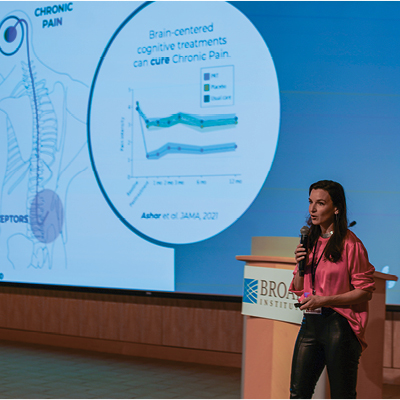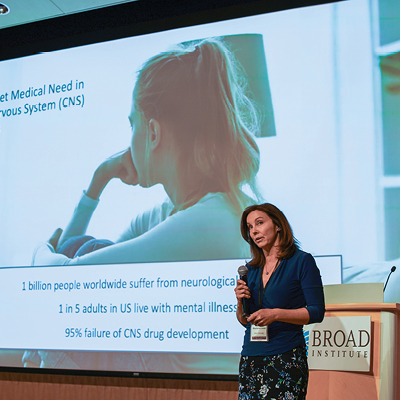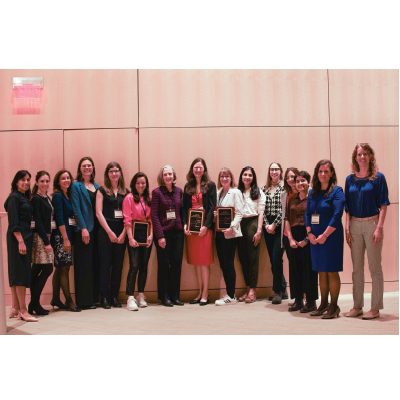
Frederike Petzschner, assistant professor (research) in the Carney Institute, received the prize from MIT’s Faculty Founder Initiative during its award ceremony on May 2. Professor of Neuroscience Stephanie Jones, as well as three other Brown faculty members, also participated in the Faculty Founder Program.
MIT launched the Faculty Founder Initiative in 2020 to help increase the number of woman-founded startups. This year, the initiative invited Brown University faculty to participate and pitch their innovative ideas to a group of leaders from academia, biotechnology, and venture capital.
“Through the Future Founders Initiative, MIT and our funders are investing in amazing women faculty and their labs to provide a path for women's discoveries and make it all the way to impact the challenging work of company creation,” said MIT President Emerita Susan Hockfield at Thursday’s ceremony.
Petzschner was recognized as a runner-up in this year’s competition for her work to develop the SOMA app. Petzscher is also the co-director of BRAINSTORM, a program within the Carney Institute’s Center for Computational Brain Science. The BRAINSTORM program supports the application and commercialization of tools from computational brain science to improve mental health and well-being.
“One out of five adults in the United States are currently suffering from chronic pain and many end up in pain for over a decade without getting the appropriate care,” she said. “As pain becomes chronic, it is accompanied by plastic changes at the level of your brain that then lead to the persistence of pain even after the tissue has already healed. “
“Instead of exclusively focusing on treating the body, we need to focus on the brain as well. The SOMA App is a digital therapeutic that focuses on delivering cognitive practices to chronic pain patients. Exercises, mind body exercises, treatments and psychoeducation are delivered directly to the patient via smartphone,” said Petzschner.
“Our founding team of neuroscientists, physicians and AI developers is building active partnerships with pharma companies and hospital networks with the long-term goal of creating a platform for physician pain care with the right patient getting the right treatment at the right time.”
Stephanie R. Jones, professor of neuroscience at Brown, was among the twelve researchers selected as finalists in this year’s competition. Her research integrates human brain imaging and computational neuroscience methods to study brain dynamics in health and disease. She develops models of neural circuits that bridge the critical gap between human brain imaging signals and their underlying cellular and network-level generators.
“In the U.S., one in five adults are living with mental illness. The challenge with mental illness is we lack credible disease models. And because of that, we have approximately a 95% failure rate in bringing drugs to market,” said Jones, who is affiliated with the Carney Institute and its Center for Computational Brain Science.

“At Ceresim Technologies, we’re unlocking neuro therapies with predictive brain simulations. Employing a technology called EEG, which non-invasively records the electrical activity of the neural circuits in the brain, our foundational software simulates the complex mechanisms of the disease and predicts therapeutic outcomes, providing quantitative objective endpoints of efficacy,” said Jones.
“With this type of simulation, we can predict failures before they happen, providing early evidence for nearly every decision that a drug development company needs to make at the preclinical stage. That's ultimately going to save time, money and increase success rates.”
All those who placed in the competition received support through events, workshops and programs. Participants were also connected with financial and thought leaders who contributed their guidance and expertise to the finalists throughout the development of their startup ideas.
 “Discoveries in brain science are critical for the development of new clinical applications and treatments to address societal needs. It is our world-class faculty - like Professors Jones and Petzschner - who bring the creativity and talent necessary for transformative treatments and cures. This is an important goal of the Carney Institute and we are thrilled that the MIT Faculty Founder Initiative recognized professors Jones and Petzschner for their exceptional contributions” said Carney Institute Director Diane Lipscombe.
“Discoveries in brain science are critical for the development of new clinical applications and treatments to address societal needs. It is our world-class faculty - like Professors Jones and Petzschner - who bring the creativity and talent necessary for transformative treatments and cures. This is an important goal of the Carney Institute and we are thrilled that the MIT Faculty Founder Initiative recognized professors Jones and Petzschner for their exceptional contributions” said Carney Institute Director Diane Lipscombe.